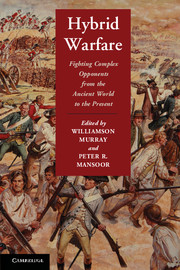Book contents
- Frontmatter
- Contents
- Figures
- Contributors
- Acknowledgment
- 1 Introduction
- 2 Conquering Germania
- 3 Keeping the Irish Down and the Spanish Out
- 4 The American Revolution
- 5 That Accursed Spanish War
- 6 The Union's Counterguerrilla War, 1861–1865
- 7 Fighting “this nation of liars to the very end”
- 8 Small Wars and Great Games
- 9 An Unexpected Encounter with Hybrid Warfare
- 10 Hybrid War in Vietnam
- 11 Conclusion
- Index
- References
8 - Small Wars and Great Games
The British Empire and Hybrid Warfare, 1700–1970
Published online by Cambridge University Press: 05 August 2012
- Frontmatter
- Contents
- Figures
- Contributors
- Acknowledgment
- 1 Introduction
- 2 Conquering Germania
- 3 Keeping the Irish Down and the Spanish Out
- 4 The American Revolution
- 5 That Accursed Spanish War
- 6 The Union's Counterguerrilla War, 1861–1865
- 7 Fighting “this nation of liars to the very end”
- 8 Small Wars and Great Games
- 9 An Unexpected Encounter with Hybrid Warfare
- 10 Hybrid War in Vietnam
- 11 Conclusion
- Index
- References
Summary
One must begin by translating between two languages – modern American and old English. The contemporary term “hybrid warfare” refers to a struggle between a conventional force, perhaps with unconventional elements, against an enemy that combines regular and irregular components, usually assumed to be guerrillas. When applied to the British imperial experience between 1700 and 1970, that term takes a broader meaning. It refers to conflicts between a regular army (usually aided by paramilitary forces) against four kinds of enemy. Ranked in order of frequency, these foes include conventional forces, ranging from phalanxes resting on spear and shield to units using European weapons and tactics; some mixture of unconventional and conventional forces; irregular forces that avoided a guerrilla strategy, because it exposed their populations to attack, but instead battled English forces on their frontiers by using conventional weapons in unconventional ways; and guerrillas who harassed conventional forces whom they allowed to occupy their villages. Hybrid warfare is one of the few areas where Britain had anything approaching a modern conception of doctrine, complete with manuals that distilled experience and guided action. The British expressed its sense through ideas such as “small wars” or “imperial policing” and linked these technical matters to political ones, especially issues of colonial policy. The British experience with hybrid warfare ranged from triumphant to incompetent. To illuminate past patterns and modern ideas, to reflect trends and variations while avoiding overgeneralization from any instance, this experience is best approached through a broad framework, combined with case studies.
These experiences stem from a context that runs like a thread across continents and centuries. European states developed armies unique on earth. Then they conquered it. From 1500 onward, they regularly fought major wars in which only the strongest survived, through a constant competition to produce armies and to improve them. State finances were honed to this end, as were administration and politics. Compromises between monarchs and nobles produced an officer corps, technically competent and politically loyal, with authority over the armies of the state. States maintained the best forces they could fund. They could become stronger simply by raising revenues and regiments. For non-European countries, conversely, to raise taxes was to create crisis, and to improve armies was to endanger the state. European polities became the most militarized and militarily effective on earth.
Keywords
- Type
- Chapter
- Information
- Hybrid WarfareFighting Complex Opponents from the Ancient World to the Present, pp. 199 - 224Publisher: Cambridge University PressPrint publication year: 2012
References
- 2
- Cited by

